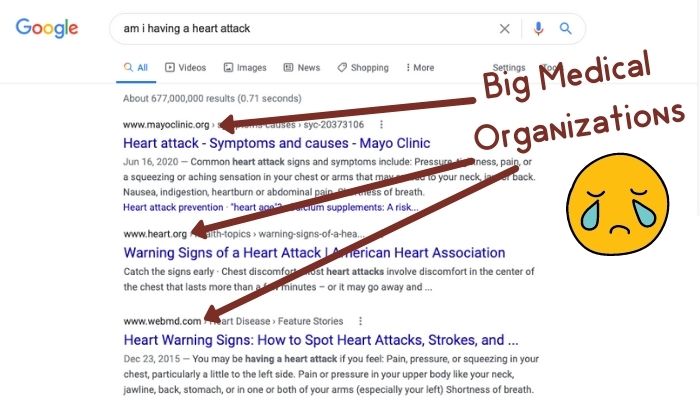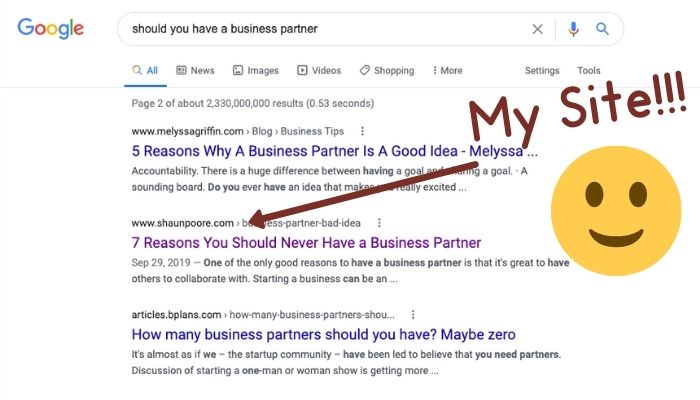Is it possible to successfully start a blog in a YMYL niche in 2021? Let’s find out!
What is a YMYL Niche?
As best I can tell, the term YMYL (Your Money or Your Life) originated from the Google Quality rater guidelines (page 10). In it, they define YMYL as a “topic that could potentially impact a person’s future happiness, health, financial stability, or safety.”
Google lists News, Current Events, Civics, Government, Law, Finance, Shopping, Health, Safety, Protected Groups as examples. The manual quality raters are asked to use their judgment as to if a query fits the definition. Many other topics (such as finding a job or where to go to college) could also be considered YMYL.
How Can a New Blogger Compete in a YMYL Niche?
Avoid YMYL Queries!
As of 2025, there aren’t as many YMYL queries as you might expect. Sure, if you wanted to rank for “Am I having a heart attack,” you’ll get a result set that only includes sites like MayoClinic, Heart.org, and WebMD.

Even if you somehow made your site authoritative enough in Google’s eyes to show up in the SERP, you’ll still never outrank this level of competition. Hell will freeze over before you can beat out the MayoClinic.
Instead, let’s think up another YMYL-ish query that isn’t quite as sensitive. The example I have is “Should you have a business partner.”
I can’t think of a world in which the choice to have a business partner doesn’t dramatically impact your money and your life. And yet, I rank at the top of page 2 (I’ll hit page 1 eventually, the post needs time to age).

This SERP is a great sign if you wanted to target this query. Another fantastic sign would be if forums like Quora or Reddit appeared in the SERP. It shows that a regular guy can rank for the topic and that you don’t have to be a major business site. You need to do this research before every post you write in a YMYL space!
People make it sound like everything is YMYL and your site needs to do some special hack to show up for YMYL queries. But, I find for everything except the most sensitive of queries, that assessment simply isn’t true.
Do Google Quality Raters Impact The SERP?
Not directly, Google Quality Raters only exist to verify whether Google’s algorithm is doing a good job or not. The raters can’t individually affect your site’s rankings. Here’s a quote from Google about the purpose of their search quality raters.
Your ratings will not directly affect how a particular webpage, website, or result appears in Google Search, nor will they cause specific webpages, websites, or results to move up or down on the search results page. Instead, your ratings will be used to measure how well search engine algorithms are performing for a broad range of searches.
Despite this lack of teeth, the Google Quality rater guidelines actually provides a real template about what Google is looking for when it’s trying to determine a website’s authority. It’s a document you’ll want to pay attention to as it’s basically a roadmap to higher rankings. Here are a handful of things that the ratings PDF suggests for its quality raters to seek out for websites.
- Easily identify the Title and Main content within the page.
- Easily navigate to the home page.
- Easily find who is responsible for the website and who created the content on the page. (Calls out about, contact, career, and author pages specifically)
- Website or Creators External Reputation (News articles, Wikipedia articles, blog posts, magazine articles, forum discussions, and ratings from independent organizations)
And here’s what the guidelines ask the raters to look for on the landing page itself.
- The Purpose of The Page
- Expertise, Authoritativeness, Trustworthiness (more on this later)
- Main Content Quality and Amount
- Information about who is responsible for the main content
- Website Reputation (as described above)
Expertise, Authoritativeness, & Trustworthiness (EAT)
This is the item that everybody is getting stuck on because the other items on the list are very simple to do. Have a non-sketchy website, put author info on your articles (even if you’re writing with a pen name), write good content. If you do all that (which most of us are), you’ve checked all the boxes except for EAT.
Your site can’t rank for the query, “Am I having a heart attack.” Google has thrown down the hammer on a regular guy ranking for a query this sensitive. If you Google these results, you’ll only see results from the most trusted medical sources that Google thinks it has.
Luckily, most YMYL topics don’t have such stringent result-sets. Here’s what the Google Quality Rater Guidelines have to say on the subject.
Some topics require less formal expertise. Many people write extremely detailed, helpful reviews of products or
restaurants. Many people share tips and life experiences on forums, blogs, etc. These ordinary people may be
considered experts in topics where they have life experience. If it seems as if the person creating the content has the
type and amount of life experience to make him or her an “expert” on the topic, we will value this “everyday expertise” and
not penalize the person/webpage/website for not having “formal” education or training in the field.
It’s even possible to have everyday expertise in YMYL topics. For example, there are forums and support pages for
people with specific diseases. Sharing personal experience is a form of everyday expertise. Consider this example.
Here, forum participants are telling how long their loved ones lived with liver cancer. This is an example of sharing
personal experiences (in which they are experts), not medical advice. Specific medical information and advice (rather
than descriptions of life experiences) should come from doctors or other health professionals.
How To Improve EAT on Your Website.
Since the Google Quality Rater Guidelines is the only instruction we have from Google about EAT, you’re going to want to look into that document for ways to increase your site’s authority.
The simplest tip I have is to do the items that are easily within your control.
- Be able to easily identify the Title and Main content within the page.
- Easily navigate to the home page.
- Easily find who is responsible for the website and who created the content on the page. (Calls out about, contact, career, and author pages specifically)
- Easily understand the purpose of the page
- Improve Main Content Quality and Amount
- Information about who is responsible for the main content
- Provide lived life experiences as your own form of EAT.
- Avoid extremely YMYL queries as we discussed earlier.
Everybody wants you to tell them how to have Wikipedia pages written about you while getting featured in the NY Times on the reg. Unfortunately, Google designed YMYL precisely so that they wouldn’t rank you for queries like “Am I having a heart attack.”
Your best bet is to simply avoid queries like this entirely. And if you think about it, do you really want a random blogger ranking for something like that? I don’t, and society will be better off if people can’t trick Google into ranking them for something so sensitive.


